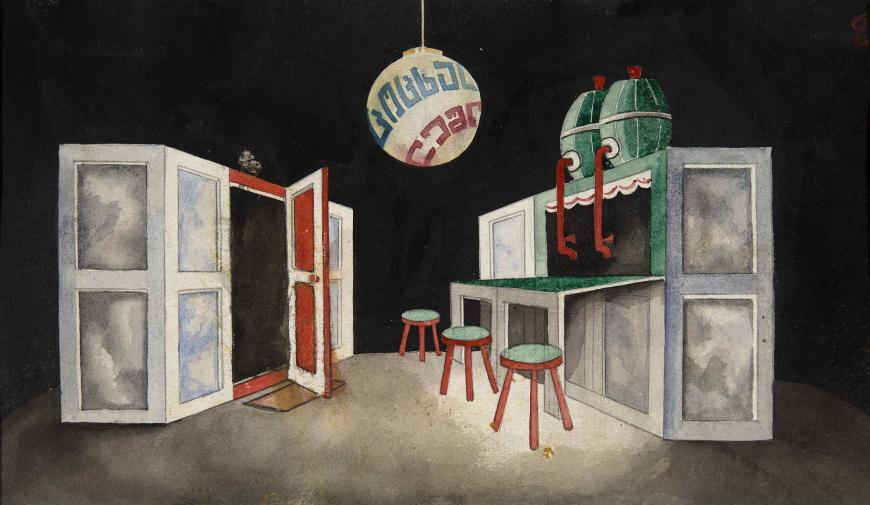Europalia: l’avanguardia in Georgia in mostra a Bruxelles
Il festival biennale Europalia presenta al pubblico la mostra "L’avanguardia in Georgia (1900-1936)", al Museo Bozar di Bruxelles fino al 14 gennaio 2024.

Il festival biennale Europalia presenta al pubblico la mostra "L’avanguardia in Georgia (1900-1936)", al Museo Bozar di Bruxelles fino al 14 gennaio 2024.

(English translation below)
Il festival biennale Europalia presenta al pubblico la mostra L’avanguardia in Georgia (1900-1936), al Museo Bozar di Bruxelles. La curiosità per il Caucaso si sviluppa in un contesto europeo che stimola l’incontro con le realtà alle porte del nostro continente. In quanto giovani europei, la consapevolezza della storia dei nostri vicini è essenziale, soprattutto quella dell’avant-garde, simbolo di resistenza e cambiamenti sociali.
Dopo la caduta dell’Impero russo e la Rivoluzione d’Ottobre, la Georgia si dichiara indipendente nel 1918. Il movimento avanguardista georgiano, con la sua importanza e radicalità, non divenne parte della storia europea, e cambiò con l’invasione sovietica del 1921. La mostra presenta libri, film, disegni, fotografie dell’epoca come un incontro tra Occidente e Oriente che crea una realtà a parte.
In quei brevi anni di libertà, artisti di vario tipo si incontravano nei café e nei locali di Tbilisi e Kutaisi. Personaggi e amicizie si lasciavano ispirare dai movimenti della loro epoca che con immaginazione e determinazione, immaginavano un futuro migliore e diverso. Dal simbolismo, al futurismo, espressionismo e cubismo.
Il festival Europalia è dedicato alla Georgia quest’anno: in congiunta alla mostra del Bozar, il festival racconta anche della polifonia, del canto a più voci, come un’altra forma di arte. Cori georgiani, tradizioni e supra, ovvero gli inviti intorno a tavoli imbanditi, sono elementi alquanto importanti della cultura sviluppatasi nei decenni di occupazione e poi, di liberazione georgiana. Infatti, il tema centrale del ricordo, alla quale si rilega tutta la mostra, contribuisce allo sviluppo di un’identità tra un’era sovietica, un’era d’indipendenza, e di dolore condiviso, dal quale si può crescere insieme.

ENGLISH VERSION
The biennial Europalia festival presents to the public the exhibition The Avant-Garde in Georgia (1900-1936), at the Bozar Museum in Brussels. A curiosity for the Caucasus developed in a European context that stimulates the encounter with the realities at the gates of our continent. As young Europeans, awareness of the history of our neighbours is essential, especially that of the avant-garde, a symbol of resistance and social change.
After the fall of the Russian Empire and the October Revolution, Georgia declared itself independent in 1918. The Georgian avant-garde movement, with its importance and radicalism, did not become part of European history, and changed with the Soviet invasion of 1921. The exhibition presents books, films, drawings, photographs of the time as a meeting between West and East that creates a separate reality.
In those short years of freedom, artists of various kinds met in the cafes and clubs of Tbilisi and Kutaisi. Characters and friendships were inspired by the movements of their time that with imagination and determination, imagined a better and different future. From symbolism, to futurism, expressionism and cubism.
The Europalia festival is dedicated to Georgia this year: in conjunction with the exhibition of the Bozar, the festival also tells of polyphony, singing with multiple voices, as another form of art. Georgian choirs, traditions and supra, that is, invitations around tables, are very important elements of the culture developed during the decades of occupation and then of Georgian liberation. In fact, the central theme of memory, to which the entire exhibition is bound, contributes to the development of an identity between a Soviet era, an era of independence, and shared pain, from which we can grow together.
